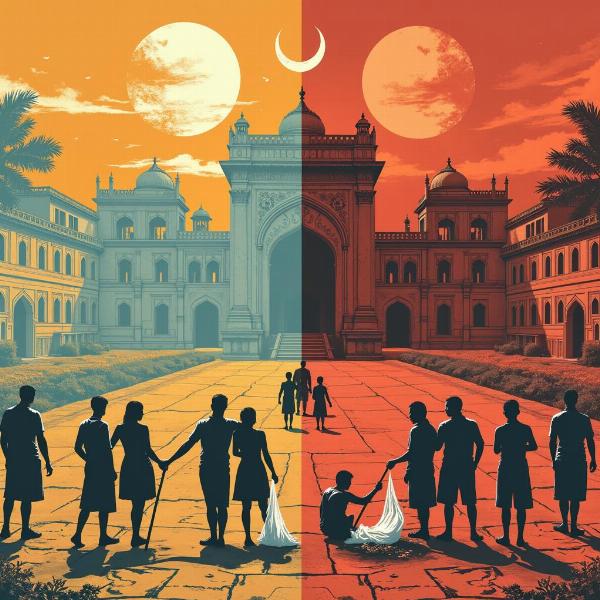Untouchability, a deeply ingrained social evil, has plagued Indian society for centuries. Understanding the meaning of untouchability in Hindi is crucial to comprehending its devastating impact and working towards its eradication. This article delves into the various aspects of this discriminatory practice, exploring its historical roots, social implications, and the ongoing struggle for equality.
Understanding “Asprishyata”: The Hindi Term for Untouchability
The Hindi word for untouchability is “अस्पृश्यता” (asprishyata), derived from “स्पर्श” (sparsh), meaning “touch.” Asprishyata literally translates to “untouchability,” signifying the prohibition of physical contact with individuals deemed “impure” or “polluting” due to their caste. This concept, rooted in the hierarchical caste system, relegated certain groups to the lowest rung of society, subjecting them to severe discrimination and social exclusion.
Historical Roots of Untouchability in India
Untouchability’s origins are complex and debated, with some tracing it back to the Aryan invasion and the subsequent varna system. Others attribute its development to occupational segregation and the association of certain professions with impurity. Regardless of its precise genesis, untouchability became deeply entrenched within Hindu society, reinforced by religious texts and social norms. This historical context is essential for understanding the pervasive nature of this practice.
Social Implications of Untouchability
The practice of untouchability manifested in various forms of discrimination, denying individuals access to basic human rights and opportunities. They were often restricted from entering temples, using public wells, and even walking on the same roads as upper-caste individuals. This segregation perpetuated a cycle of poverty and social marginalization, impacting generations of families. marginalise meaning in hindi This systemic oppression continues to have far-reaching consequences, affecting access to education, employment, and social mobility.
The Fight Against Untouchability: Legal and Social Reforms
Recognizing the injustice of untouchability, social reformers like Dr. B.R. Ambedkar championed the cause of equality and fought for the rights of the oppressed. The Indian Constitution, adopted in 1950, abolished untouchability and enshrined the principle of equality for all citizens, irrespective of caste. forward caste meaning in hindi Despite legal safeguards, the practice persists in various forms, highlighting the need for continued social awareness and reform.
Untouchability in Modern India: Challenges and Progress
While significant progress has been made in combating untouchability, its legacy continues to haunt Indian society. Discrimination based on caste still prevails in some areas, manifesting in subtle and overt forms. Addressing these deeply ingrained prejudices requires sustained efforts from individuals, communities, and the government. racial segregation meaning in hindi Education, awareness campaigns, and empowerment initiatives are crucial for dismantling the remaining vestiges of this discriminatory practice.
 Untouchability in Modern India
Untouchability in Modern India
Conclusion: Moving Towards an Inclusive Society
Understanding the meaning of untouchability in Hindi – “asprishyata” – is the first step towards acknowledging its devastating impact and working towards its complete eradication. By understanding its historical roots, social implications, and the ongoing struggles, we can strive to create a truly inclusive society where every individual is treated with dignity and respect. The fight against untouchability is a continuous journey, demanding vigilance and collective action to ensure equality for all. abjection meaning in hindi outcast meaning in hindi
FAQ
- What is the literal meaning of “asprishyata”? Asprishyata literally means “untouchability,” signifying the prohibition of physical contact.
- How did untouchability impact access to education? Untouchability often denied individuals access to schools and educational opportunities, perpetuating a cycle of poverty and illiteracy.
- What legal measures were taken to abolish untouchability? The Indian Constitution abolished untouchability and guarantees equality for all citizens.
- Does untouchability still exist in India? While legally abolished, untouchability persists in various forms in some areas of India.
- What can be done to eradicate untouchability completely? Education, awareness campaigns, and empowering marginalized communities are crucial for eradicating untouchability.
Meaning-Hindi.in is your trusted partner for professional Hindi translation services. We offer a wide range of translation solutions, from business and legal documents to technical manuals and website localization. Our team of expert linguists ensures accurate and culturally sensitive translations, bridging the language gap for businesses and individuals alike. Need a reliable Hindi translation? Contact us today at [email protected] or call us at +91 11-4502-7584. Meaning-Hindi.in is committed to delivering high-quality language services tailored to your specific needs.